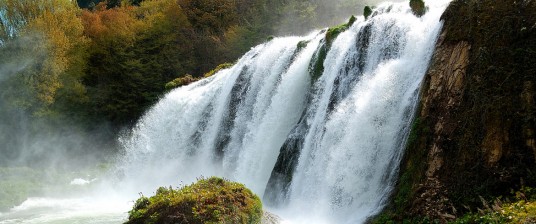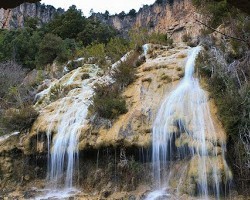
The falls are a true miracle of nature, their momentum can upset a landscape and their roar create some uneasiness, but at the same time give truly evocative visions.
Find them is not always easy to admire and, sometimes, you have to set off for hours, but when you reach these remote corners of nature… well, the show is guaranteed.
For the uninitiated, besides the famous and beautiful Marmore Falls, Umbria, our peninsula is dotted with a multitude of must-see waterfalls. Let’s find out where they are!
Acquafraggia Waterfalls in Valchiavenna (Sondrio)
Acquafraggia waterfalls, Borgonuovo, in the municipality of Piuro in Valchiavenna, come from Pizzo Lake at an altitude of 3050 meters. The origin of the name Acquafraggia comes from “acqua fracta”, that means stream constantly interrupted by waterfalls. This incredible waterfalls impressed even Leonardo da Vinci that admired the wild beauty and mentioned in his “Atlantic Codex”.
The presence of an equipped path inside the park allows you to visit closely the environment surrounding the falls, and from the panoramic terraces along the path, you can admire the entire valley towards the plain of Chiavenna.
Several hiking trails within the park take as their starting point the Acquafraggia waterfalls.



The waterfall of Isola del Liri (Frosinone)
High about 27 meters, the Great Waterfall of Liri is located in Frosinone, a hundred kilometers from Rome towards Naples. The special feature of this cascade is to be the only one in Italy set within a residential complex, a kind of island born from the branching of the Liri River, that near the castle Boncompagni – Viscogliosi splits.

The waterfall of Isola del Liri, photo by daddo83 via flickr
Molina Waterfall Park, Fumane (Verona)
The Molina Waterfall Park is due to the intuition of Professor Giuseppe Perin, geologist. Struck by the uniqueness of the falls area, he proposed to Molina community and local authorities to set up the park, which annually draws between 30,000 and 50,000 visitors. In Molina, you can breathe the magic atmosphere of a small medieval village. The name of this village of stone comes from the presence of the mills in the country and along the valley nearby. You mist visit the Botanical Museum of the Lessinia Molina, inaugurated in 1981, and the Cave of Fumane, discovered in 1962, inhabited for a very long period by Neanderthal man (60,000 years ago), until the collapse of the cave probably dating back to 25,000 years ago, as a result and effect of an ice age.
The third Sunday of July there’s the festival of the falls.
For info: http://www.parcodellecascate.it/



The Dardagna Falls and the Sanctuary of Madonna dell’Acero (Bologna)
The name Dardagna comes from a stream; the waterfalls are located in Lizzano in Belvedere, in the Corno alle Scale Park. You can get to the waterfalls comfortably starting from a parking lot in front of the Sanctuary of Madonna dell’Acero, from which you can admire the great maple protected as a monumental tree and the view from the terrace of the surrounding valley.



Nardis waterfall, Genoa Valley – Western Dolomites (Trento)
Located in the western sector of the Adamello Brenta, Val di Genova is the Valley of the Falls that plunge from the typical steps of the glacial valley. The Nardis waterfall is the first one you reach when going from Carisolo.
The recommended period to visit this wonder of nature is from May to October, but in winter too there are interesting attractions like the adventurous “Wilderness”.

Nardis waterfall, photo by Simone Capretti via Flickr
Waterfalls of Monte Gelato in Treja Valley, Mazzano Romano (Rome)
Chosen by many directors for their outstanding beauty, the Monte Gelato falls have become the setting for many films and television dramas and deserve, for sure, a short visit. Nearby there are the important remains of a water mill used from 1830 until the end of World War II.
For the adventurous there is Treja Adventure, the first adventure park on the outskirts of Rome http://www.trejaadventure.it/info.php

Waterfalls of Monte Gelato, photo by Paul Albertella via Flickr
Toce Waterfall, Formazza (Verbania)
Described as: – “The Most Beautiful, the most powerful among the waterfalls of the Alps” with its 143 meters is the second in Europe for height. To admire in all its majesty the water jump there’s a wooden bridge that juts out on the waterfall. Toce Waterfall is not always visible during the year, as the Toce water is collected for the production of electrical energy.

Toce Waterfall, photo by iMaic87 via Flickr
Bargain Waterfalls, Eisacktal, South Tyrol (Bolzano)
Beyond the village of Barbian, above Ponte Gardena, there are beautiful waterfalls that amaze for their crash to the ground. Its t’s ideal destination for a day trip or a refreshing afternoon during the summer season. Walking this path takes about 2 and a half hours, but if you do not want to walk, you can reach only the first waterfall which has a jump of 85 meters.

Varone Waterfalls, Lake Tenno near Riva del Garda (Trento)
Located in the municipality of Tenno, Trento, a few km from Lake Garda, the Varone Falls are named after the town nearby. Visited each year by many visitors, the caves from where the water falls with a deafening noise, were opened to the public in 1874.
For info: http://www.cascata-varone.com/

Acquacheta waterfalls (Forlì-Cesena)
Located within the National Park of Casentino Forests, Mount Falterona and Campigna, the Acquacheta is a stream that is born in the Tuscan Apennines, in the Province of Florence. Shortly before moving to San Benedetto in Alpe, it plunges dramatically from a high leap, splitting into a thousand noisy rivulets.
Quoted by Dante Alighieri in the Divine Comedy is now a tourist destination also for the literary value of the place.

Acquacheta waterfalls, photo by magostinelli via Flickr
Riva waterfall (Bolzano)
The Riva Waterfalls are located in Campo Tures. They can be reached along a hiking path or the path of St. Francis near Campo Tures. This wonder of nature is formed by three waterfalls, one more powerful than the other.
The Riva falls are undoubtedly among the most beautiful in South Tyrol. The largest of the three is thrown from a vertical rock in 42 meters deep.



Mill waterfall, Saturnia (Grosseto)
The peculiarity of these falls is given not only by the waterfalls, but also from the many small pools formed below that create a truly magical setting. Many tourists and locals come here to relax enjoying the relaxation and tranquility, finding moments of pure pleasure. The water flows from a natural spring at a temperature of 37.5 ° C.



Waterfalls of Sasso (Pesaro Urbino)
This waterfalls are originated by the presence of a bank of calcareous layers. To visit the waterfall from the bottom you will access to the river through a passage located at a renovated house, the Mill of the Stone, which retains few traces of the functional structures of the original mill. Along this stretch of the river you can meet the Kingfisher, the Grey Wagtail and White Wagtail.

Lequarci Waterfalls (Sardinia)
The Lequarci Falls are located at the area of Santa Barbara, in the town of Ulassai, in Sardinia. The main waterfall of the area is characterized by a jump of almost 100 meters that can reach a width of 70 meters. Nearby there’s the Cave “Su Marmuri”, among the largest and most impressive of Sardinia.
Those who decide to stay in this corner of Sardinia, a perfect destination for free-climbing enthusiasts, can spend the night at the Hotel Su Marmuri.



Fiumelatte waterfall, Varenna (Lecco)
The Fiumelatte is the shortest river in Italy and it’s so called because its sparkling and white waters look like milk.



Serio Falls, Upper Seriana (Bergamo)
Originated from the River Serio, which first formed the Barbellino Lakes (Upper and Lower), the Serio Falls consist of a triple jump for a total of 315 meters, the highest in Italy and the second in Europe. Since 1931, in the site of a small natural lake, a dam was built for the production of electricity, which interrupted the flow of the river. Now, since 1969 5 times during the summer season, the dam reopened and it’s possibile to admire again this wonder of nature.



Waterfall of Parcines (Bolzano)
Dominated by the impressive scenery of the Texel Group, Parcines is best known because of its waterfall and the Museum of the Typewriter. The municipality of Parcines winds through a dense network of 200 km long trails, between pleasant walks in the valley and pretentious alpine tours. In the background, you’ll find the waterfall of Parcines, the highest in South Tyrol, with a jump of 98 meters. It’s definitely one of the natural wonders near Merano that you can’t miss!

Waterfall of Parcines, photo by AlbeJTD via Flickr
From the hot springs to small and almost unknown havens, here is where to dive into nature this summer, savoring the age-old tranquility of these places. Of course, this is just a taste, and as many waterfalls will surprise you with their wonderful nature during your upcoming itineraries. Share with us your stories!
You might also like:
Free Spa? Top 5 Italy Hot Springs to visit
Do you believe in fairy tales?
The article The most spectacular waterfalls in Italy was originally posted on Ecobnb.